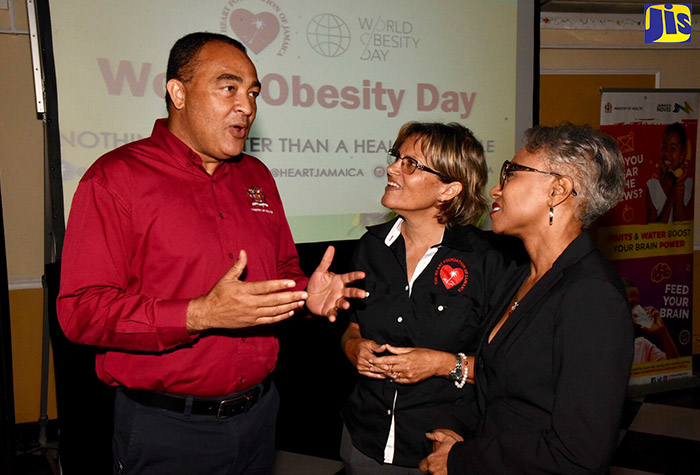Health Minister Calls for Behaviour Change to Tackle Obesity
By: , October 12, 2018The Key Point:
The Facts
- “Part of the challenge that we face in combatting the scourge of non-communicable diseases (NCDs) is that we are not as consistent as we ought to be in trying to address, not just perception but also behavioural change,” he said.
- Dr. Tufton was speaking at the launch of the third phase of the obesity-prevention campaign in Jamaica, held at the Terra Nova All-Suite Hotel in St. Andrew on October 11.
The Full Story
Minister of Health, Dr. the Hon. Christopher Tufton, says behaviour change is critical to reduce obesity levels and to improve lifestyle choices in the country.
“Part of the challenge that we face in combatting the scourge of non-communicable diseases (NCDs) is that we are not as consistent as we ought to be in trying to address, not just perception but also behavioural change,” he said.
Dr. Tufton was speaking at the launch of the third phase of the obesity-prevention campaign in Jamaica, held at the Terra Nova All-Suite Hotel in St. Andrew on October 11.
“This (change) doesn’t come overnight; this is going to require consistent effort. It is going to have to deal with objections, which you will get from time to time, and what we are aiming to do is to create, over time, a change in behaviour because until we change behaviour, we are not going to achieve the objectives that we have set for ourselves,” he said.
Data from the 2016/17 Jamaica Health and Lifestyle Survey showed that one in two Jamaicans or 54 per cent were overweight or obese.
The data further revealed that women are more affected by overweight/obesity, with two-thirds of Jamaican women 15 years or older being overweight or obese.
The overall weight/obesity trend for adults is 34 per cent in 2000, 51.7 per cent in 2008 and 54 per cent in 2016.
Recent findings from the Global School-based Student Health Survey (2017) show that obesity is increasing for boys and has almost doubled from 5.3 per cent to 10.3 per cent, and from 6.7 per cent to 9.9 per cent for girls.
In the meantime, Dr. Tufton said the Government is taking a holistic approach to combatting unhealthy lifestyle choices, particularly from the earliest age, with the introduction of several initiatives.
These include the restriction on certain types of sugary beverages come January 2019; the development of the school nutrition policy, in conjunction with the Ministry of Education, which will influence what is prepared within the school system.
“We have reintroduced in the schools our sealant and fluoride programmes,” he said, adding that this is being undertaken through the Ministry’s Oral Health Programmes.
He noted, too, that the Ministry’s Jamaica Moves initiative will be introduced in schools shortly.
This introduction is to be guided by a nutrition policy, a physical activity regime, as well as public education on health and wellness programmes.
Jamaica Moves is part of the National Strategic and Action Plan for the Prevention and Control of Non-communicable Diseases, which covers seven main categories of diseases – cardiovascular conditions, cancers, chronic respiratory diseases, diabetes, sickle cell, mental health disorders and chronic renal failure.
Dr. Tufton said the third component of the campaign, which is being led by the Heart Foundation of Jamaica, in collaboration with several partners, including the Ministry, is critical.
The new phase of the campaign focuses on reducing children’s consumption of sugary drinks.
Entitled ‘Are Your Children Drinking Themselves Sick?, the campaign shows the negative effects of sugary drinks on physical and dental health, from childhood into adulthood, and encourages Jamaicans to reduce consumption of sugary drinks at home and at school.




